Automotive retail: How going digital can drive change for automakers
With the lines between the physical and digital worlds fast blurring, the automotive retail business is one of the most impacted in a time of social distancing and fewer showroom footfalls. Top industry stakeholders share notes on how digital tools can drive demand and how car buyers in India are responding to the new reality.
The lines between the physical and the digital world are increasingly blurring and how. With social distancing becoming the new normal in a Covid-scarred world, the digital experience holds a unique and almost indispensable position, almost the quintessential ‘bridge across forever.’
Autocar Professional sought to probe deeper into this very phenomenon, the increasing role of the digital impression in all things automotive, especially the digital retail experience.
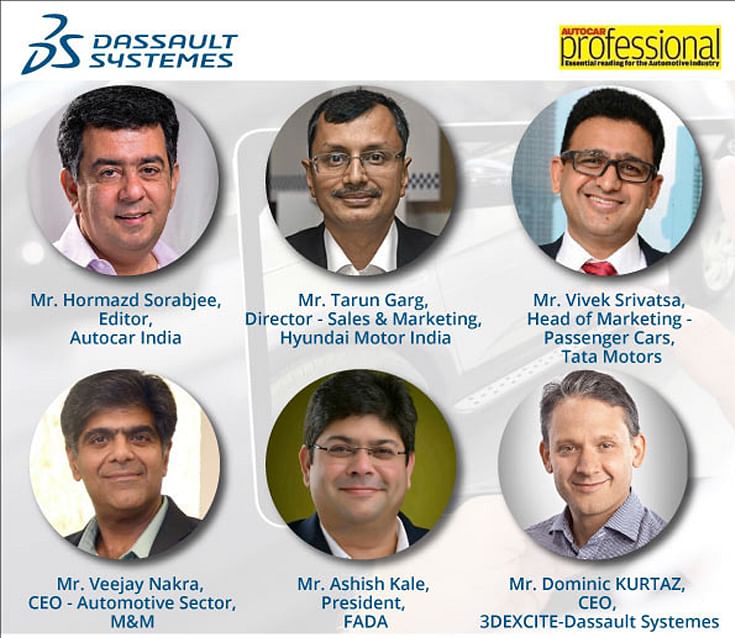
It came to fruition in the latest virtual conference titled ‘Future of Automotive Retail – Inspiring Digital Experience For Virtual Engagement', held on June 26. The five industry panelists included:
- Dominic Kurtaz, CEO, Dassault Systèmes 3DEXCITE
- Veejay Nakra, CEO, Automotive Division, Mahindra & Mahindra
- Tarun Garg, Director, Sales & Marketing, Hyundai Motor India
- Vivek Srivatsa, Head – Marketing, Passenger Vehicles Business Unit, Tata Motors
- Ashish Kale, President, FADA
The virtual conference, which was moderated by Hormazd Sorabjee, Editor, Autocar India , raised some key questions about the future of automobile dealerships and how the digital experience can seamlessly weave with physical to make sure the customer does not miss out on the ‘touch- and-feel’ aspect even in a socially distanced world.
3DEXCITE’s Dominic Kurtaz: 'The car is no longer a mode of transportation, it is a connected product.'
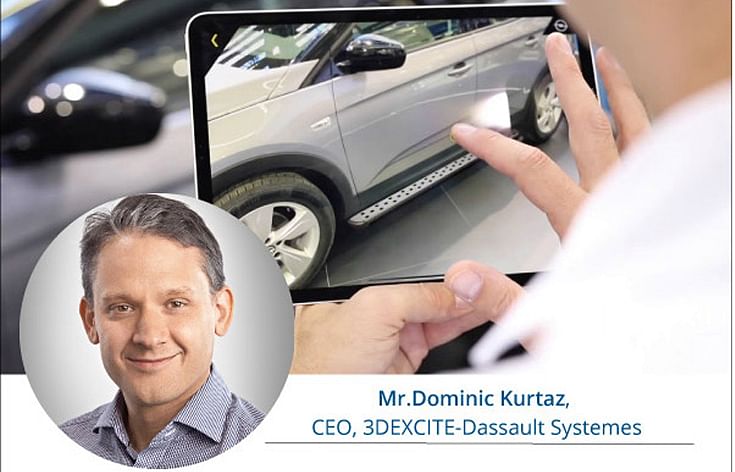
Dominic Kurtaz, CEO, Dassault Systèmes 3DEXCITE says, “The future of automotive retail is extremely exciting. The car is no longer a mode of transportation, it is a connected product.”
Kurtaz pointed out that the, “The entire journey of a product from conceptualisation to real-world introduction and later on interactions between customers, companies and dealers, today rely on a balanced mix of real and virtual experiences.”
He explained the role of technology providers such as Dassault Systemes in this entire endeavour of the automotive industry to switch to the digital platform, and mentioned the company’s 3DExcite software suite that plays a key role in offering digital product experiences. According to him, being able to modulate and simulate the product is no longer good enough and highlighted the need to modulate and simulate the bigger picture and not just the product.
Kurtaz feels, “The principles of 3D experience go from initial concept to being able to visualise the exact virtual representation. It needs to also build behavioral elements into this visualisation.”
Leveraging digital capabilities
Kutaz echoed the other speakers’ perspective on the growing importance of data and how that can help adapt to the enhanced digital focus in the automotive world. As innovators increasingly try to bring the virtual and physical experience into one seamless journey for the automotive customer, Kurtaz’s concluding thoughts focused on the role of data. According to him, “Data drives the kind of experiences we deliver and the data feedback allows us to take forward a constant evolution of experience.”
Mahindra & Mahindra's Veejay Nakra: ‘Once you get the taste of convenience, it is difficult to go back.'
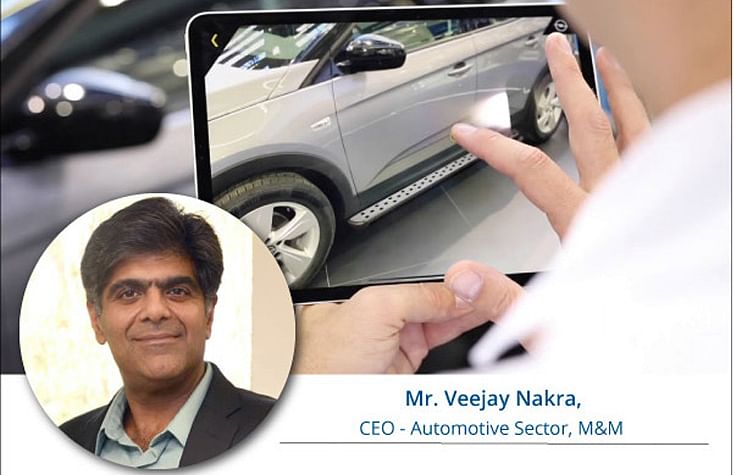
Veejay Nakra, CEO -Automotive division, Mahindra & Mahindra says that automobile customers are unlikely to go back to earlier ways of purchases now, “Once you get the taste of convenience, it is difficult to go back. In this new era of digital experience where you not only browse and surf but also exchange vehicles, arrange finances and the dealer comes home to complete documentation, why would anyone say no?”
Commenting on the acceleration towards digitalisation caused by emergence of Covid19, Nakra remarked that “re-inventing and re-imagining” is the buzzword in the automotive world today. “If you see the situation in the past five years, Covid-19 has been the inflection point to push OEMs to leverage digital as a way to enhance consumer experiences,” said Nakra, who has been associated with M&M for close to 26 years now.
According to Nakra, Covid-19 has brought fundamental shifts in the consumer habits. “Safety and convenience are now the two most important pillars” in the customer’s mind, according to him, while making purchase decisions. The development seems significant considering the fact that footfalls at the showrooms have significantly lessened since the lockdown across the country to contain the spread of Covid-19. Though showrooms have begun opening since May , a significant percentage of customers largely preferred making purchases digitally due to the fear of getting infected.
“The role of digital in marketing is the most important aspect to focus on. Using all different types of digital analytic tools available, you can get a lot of information about consumer preferences and insights” added Nakra.
Nakra emphasised that though digitalization will become prevalent in metros and large cities, smaller towns will see the concept of digital and physical stores surviving side by side. When asked to comment whether vehicle purchase can get totally digital, Nakra signed off saying, “I think we are still 4-5 years away from a situation where the car buying process is completely digital. It’s more of a crystal ball gazing game at the moment”.
Hyundai Motor India’s Tarun Garg: ‘We have to be empathetic with the customer.’
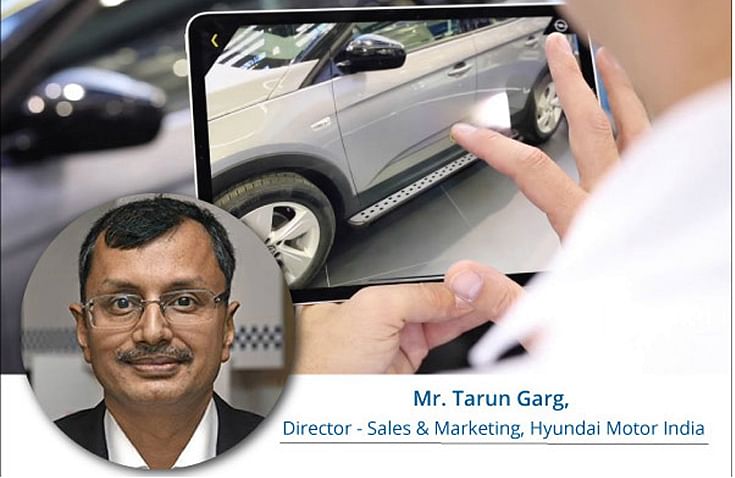
According to Tarun Garg, director, Sales and Marketing, Hyundai Motor India, “This shift towards digital has been quite a dramatic one. At Hyundai, our digital inquiries have moved from being placed between 10-12 percent last year to now in the range of 25-30 percent during the last two months of the Covid-19 crisis.”
However, while the Korean carmaker’s chief marketeer highlighted this emerging trend, he also acknowledged the fact that car buying still remains an emotional and social experience for customers. “The moment the lock-down was eased, most customers pressed upon coming to the showrooms for taking delivery of their new cars, even when we offered doorstep delivery,” said Garg.
“So, the car is going to remain a priced possession and the role of dealers is going to be very critical,” he remarked.
Garg gave an update about the online visitor footfall on the CTB portal and said that since its introduction in March 2020, already 12 lakh customers have visited the company’s online retail portal, and are now able to get much more trustworthy information about a product as well as get personalised experience for buying a new car.
He also shed light on the benefits that technology in terms of being a big enabler to rationalise costs in the back-end of a dealer’s operation as well.
“There are so many things that can be done with the customer as well as sales personnel sitting at home. The training of dealer workforce used to be a huge expense and over the last two months, we have suddenly found that trainings can be successfully done online as well. So, this is a huge enabler in allowing dealers reduce their expenses,” Garg said.
Digital trends: rural versus urban
While digital is making huge strides in the urban confines, the big question that arises is whether it is having an equally strong impact in the rural areas and Tier 2 towns as well.
According to Garg, “Digital penetration in the hinterland is very much there and technology, with the lowest cost of Internet in India, is diminishing the demarcation between urban and rural areas.”
“After integrating our outlets in the urban areas on the CTB platform, we managed to integrate our entire rural sales channel online, but were surprised to see that within just one week of floating the idea, more than 30 percent of our dealer partners from the hinterlands opted to get digitally connected, completely knowing the scenario of their local markets well,” he added.
“Also, the interest in our new models, for instance, the newly launched second-generation Creta SUV, has been equally strong from rural markets compared to urban cities. So, technology has really brought India together and the differentiation between aspirations is becoming very thin,” Garg said.
Garg also pointed out that within the new consumer trend, vernacular could be the next revolution in digital and that OEMs will have to play a key role there.
Co-existence of physical and digital
He further explained that, “We have to know the customer much more. While a customer sitting at home can go to the website and personalise the car, we will have to complete the entire experience at the showroom.”
“We should be ready to complement the digital part of the buying journey inside the showroom,” Garg said.
Today, a customer interacts with close to 15 different people after entering a showroom to purchase a new car. So, why cannot we have a single-window point of contact for a customer?” questioned Garg.
“It would require a lot of reskilling at dealerships but it would enhance the buying experience by a huge margin,” he further explained.
“We have to be empathetic with the customer and remove the anxiety in his mind so that he feels a connect with the brand. It has to be a 360-degrere way of selling rather than selling the vehicle in a piecemeal way,” added Garg.
So, while physical showrooms and digital retail will stay for good, the change of pace in the consumer habits that has been largely driven by the pandemic will continue in the future once the Covid-19 crisis subsides as well. But can buying cars become a 100 percent digital phenomenon in the future?
According to Garg, “As things stand right now in India with a car penetration of 27 per thousand, a car is still an emotional purchase. The moment that emotion goes out of the windows and it becomes a mechanical purchase, we could see car buying becoming a completely online process.
“I don’t see that happening at least 8-10 years down the road,” he signed off.
Tata Motors' Vivek Srivatsa: ‘Thanks to the digital space, OEMs can go anywhere in the country.'
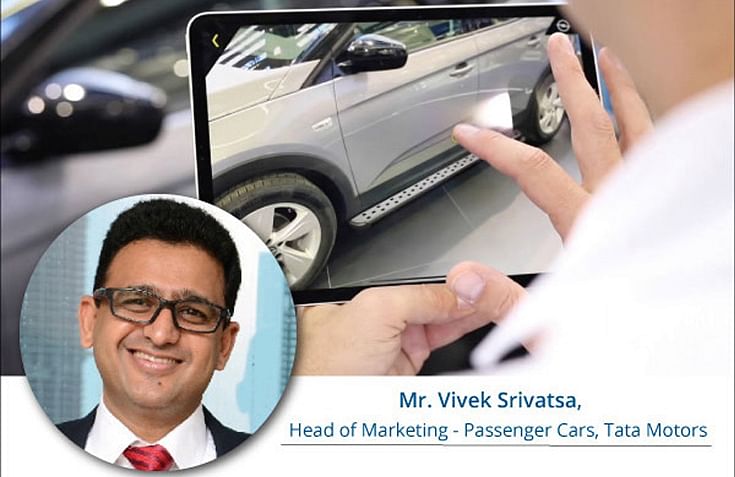
Vivek Srivatsa, Head of Marketing - Passenger Cars - Tata Motors, said that automotive and sales cannot only be digital. And, this makes it more challenging and exciting.
Sharing his views, Vivek stated, “We are looking at the situation where especially in automotive the brand value is going to be measured against the experience. Post-Covid, digital is going to lead the experience for the customer. And, we are realistically looking at a scenario where customer experience is actually defined on the screen of tablets, laptops or mobiles. The physical infrastructure will start mirroring the kind of experience customer enhances online and this is going to be more important, going forward. But, seamlessness is what successful companies in the digital space have achieved between physical and digital space. This would actually define how much the customer trusts a brand or its products.”
“All automotive manufacturers are in a different kind of space now. It cannot be only digital and this is making it more challenging and exciting. How a customer is able to seamlessly discover the car online and get the car to his location. At the same time, he does not realise the digital experience has become physical. This is what I would focus as a marketer. And, this kind of physical-digital interface can happen multiple times in car ownership cycles. Be it while buying the car or even aftersales. This is what we should be focusing on,” he added.
e-word of mouth
Vivek explained that thanks to social media, the world is probably more open than it has ever been, “Now, a simple word of mouth is digitalised and it is everywhere. It has both good and bad points and if we do not get it right the first time, there are more people who can point out where we slipped out. Customers have all the information about the product online. It is up to us to really get our act right.”
Click-order-buy a car?
In a game of literally crystal ball gazing, the speakers shared their views on the prospect of vehicles sales becoming completely digital in India. According to Vivek, “It is a question of time before it happens. There are other elements that have to fall in place. One is the entire registration part and the government data part which has to get digitalised. This will happen sooner or later. One of the key elements in add to cart and buy is how much we trust the brand and are aware of the product. The fact you do not need to test a vehicle might not be true for all brands. It is an element of a brand which is more popular and has more trust levels where customers are quite satisfied doing this kind of purchase. But, it would happen in a matter of time, maybe more than five years but within 10 years,” he concluded.
FADA's Ashish Kale: ‘Dealers are a resilient lot and we will adapt to new methods of selling.'
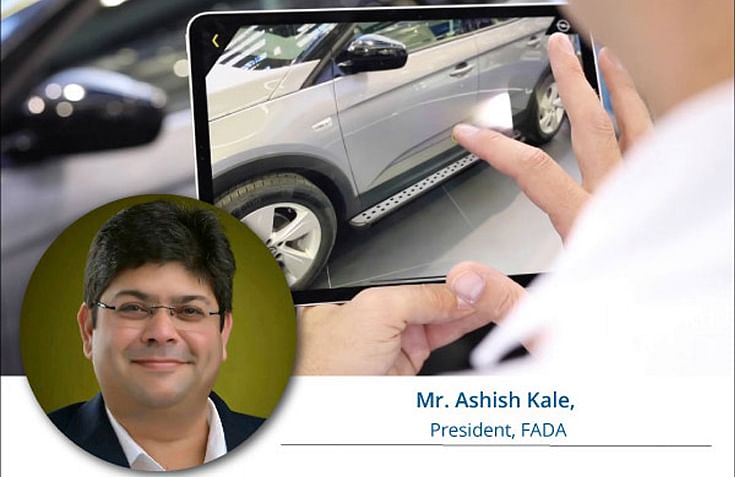
Ashish Harsharaj Kale, president, Federation of Automobile Dealers Association of India (FADA) believes dealerships will continue to be the interface between the customer and OEMs.
Representing the dealer fraternity and outlining the challenges for them, Kale agreed that the ongoing Covid-19 pandemic has changed the way of life and the acceptance for digital retail has increased. He added that though the digital enquiries had started picking up in the past two-three year, the Covid-19 has just given it “a major boost, today customer is looking at safety and convenience, but going forward (post Covid-19) convenience will remain. That is an advantage to us, as without physical reach (without expansion) we will be able to tap more customers.”
He shared his perspective on the digital front stating that with smartphones becoming more affordable, and data becoming available, customers in urban, rural are more comfortable getting in touch with dealerships through phone and the digital route. While, the last-mile process of vehicle purchase will remain physical, as it is a high-ticket purchase, for a country like India..
“Buying a new vehicle is a family decision, for Indians it is also an emotional decision. Physical will be there, the customers will look at trust and bond with the dealership and its owner, the brand plays a big role, but dealership team too plays a key role,” pointed out Kale.
Co-existence of digital and physical dealerships
The dealer fraternity head, believes that going forward physical infrastructure at dealerships will get more rationalised, the entire process of choosing, customising and selecting a vehicle may shift online. Kale added that customers are asking and sharing “brochures on WhatsApp, video calling and interacting with sales representatives. The process right upto the vehicle selection is seeing a major shift. But the final touch and feel of the vehicle will see physical interaction continue to remain. A seamless experience at physical showroom will be there, first will be digital, and then final transaction, process, relationship building and delivery will stay with physical. Going forward lot of rationalisation of dealerships, expansion will go digital.”
Responding to a query on will digitalisation and technology help dealers cut down on cost and processes? Kale explained that, “Without a doubt, it started pre-Covid, you had experience centre in places. Going forward you will now see many large showrooms. A lot of customisation will be offered by all OEMs (digitally), which cannot be offered at any single showroom. It will be more of experiencing the brand at these centres and forming relationship. We are now going to see 2 types of formats– digital and physical. We will need to offer more features on the digital side.”
Ensuring online presence and resolving disputes
As the world grows more digital, people have become more connected and information for any product or service can be found in a matter of seconds. This also means, companies and organisations need to pay a strong emphasis on pre- and after-sales services, to understand what the customers think about them.
Speaking on the possibility of vehicle purchase going completely digital, Kale signed off by saying, “Technology is a huge enabler in bringing down costs. Large showrooms may not be as necessary going forward. Showrooms would be more for the experience and forming a relationship. Expect to see smaller formats of showrooms and greater digitalisation in future. As long as emotions, experience, trust continue to be key factors influencing the car buying experience, dealerships will be important. Dealers are a resilient lot and we will adapt to new methods of selling but still see car buying becoming completely digital is a long way off in India.”
Autocar Professional thanks all the panellists, attendees from India and overseas, and Dassault Systemes 3DEXCITE for the exciting virtual conference.
READ MORE
M&M's Veejay Nakra: ‘Once you get the taste of convenience, it is difficult to go back’
Hyundai Motor India’s Tarun Garg: ‘We have to be empathetic with the customer’
Tata Motor's Vivek Srivatsa: ‘Thanks to digital space, OEMs can go anywhere in the country’
FADA's Ashish Kale: ‘Dealers are a resilient lot and we will adapt to new methods of selling’
RELATED ARTICLES
Cosmo First diversifies into paint protection film and ceramic coatings
The Aurangabad, Maharashtra-based packaging materials supplier is leveraging its competencies in plastic films and speci...
JSW MG Motor India confident of selling 1,000 M9 electric MPVs in first year
The 5.2-metre-long, seven-seater luxury electric MPV, which will be locally assembled at the Halol plant in Gujarat, wil...
Modern Automotives targets 25% CAGR in forged components by FY2031, diversifies into e-3Ws
The Tier-1 component supplier of forged components such as connecting rods, crankshafts, tie-rods, and fork bridges to l...






 27 Jun 2020
27 Jun 2020
 13763 Views
13763 Views


















 Autocar Professional Bureau
Autocar Professional Bureau




